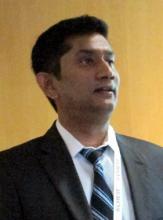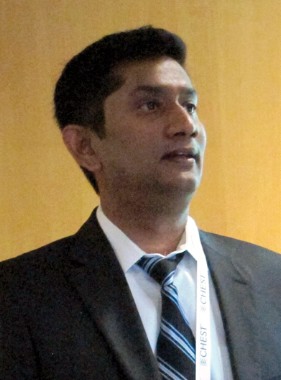User login
MADRID – Evidence is mounting that lung transplantation is feasible in highly select patients positive for human immunodeficiency virus.
A retrospective analysis of three patients revealed no long-term resurgence of HIV viremia or profound complications of overt immune suppression. CD4 counts decreased initially in one patient, but recovered after about 1 year with antiretroviral therapy (ART). All patients were adequately controlled on combination ART, had no HIV viremia for 2 years prior to surgery, and had no resistance to standard antiretrovirals.
"Not all HIV-positive patients would be candidates," Dr. Harish Seethamraju said during a late-breaking abstract session at the world congress of the American College of Chest Physicians. "You want to ensure compliance; and an ability to manage complex medication regimens would be the challenge for any person. So, people who have an in-depth knowledge about their disease and are able to manage their HIV well for a prolonged period of time would be ideal candidates."
As with other solid-organ transplants, acute rejection remains a concern and was reported in patient 1, who underwent bilateral transplant for HIV-associated pulmonary arterial hypertension. The patient experienced three episodes of rejection, including bronchiolitis obliterans syndrome and rejection with respiratory syncytial virus pneumonia requiring admission at 15 months, which tipped her course dramatically and resulted in loss of most of her lung function by post-transplant 43 months, he said.
Mild acute rejection occurred in patients 2 and 3, who were transplanted for idiopathic pulmonary fibrosis, but they remain free of acute rejection and are actively employed 15 months and 41 months after transplant.
Surgeons at Houston Methodist Hospital and the University of California, San Francisco, where the transplants were performed, also learned that ART has to be initiated very early on post-transplant, said Dr. Seethamraju, now medical director of the lung transplant program, University of Kentucky, Lexington.
"In patient 2, we found a resurgence of HIV viremia within 10 days, but we just stopped the medication for the first 4 days and that’s all it took for the virus to come back," he said.
The study findings should provide guidance for clinicians considering transplantation in the wake of the recently approved HIV Organ Policy Equity (HOPE) Act, which made it legal in the United States now to transplant HIV-positive organs in HIV-positive patients. HIV patients are often referred for lung transplant because of an increased incidence of pulmonary hypertension and infections, but their HIV status has traditionally been taken as a contraindication due to the potential risks of added immunosuppression, said Dr. Seethamraju. Only one case report has been published of an HIV and hepatitis B virus coinfected patient with cystic fibrosis who underwent successful double lung transplant, he said.
During a discussion of the study, CHEST Congress cochair Dr. Joan Soriano, of Hospital Universitari Son Espases, Palma de Mallorca, Spain, asked whether any of the centers would consider lung transplantation in HIV-positive patients with chronic obstructive pulmonary disease (COPD).
Dr. Seethamraju replied that COPD is the second-most-common indication for transplant after idiopathic pulmonary fibrosis and interstitial lung disease, but that the United Network for Organ Sharing 2005 lung allocation scores are very low for COPD patients, and thus organs would be hard to obtain for this specific group of HIV patients. "But it would be a great candidate for us," he added. "We would definitely do a transplant in that group of patients, irrespective of their HIV status."
Dr. Seethamraju and his coauthors reported no relevant disclosures.
MADRID – Evidence is mounting that lung transplantation is feasible in highly select patients positive for human immunodeficiency virus.
A retrospective analysis of three patients revealed no long-term resurgence of HIV viremia or profound complications of overt immune suppression. CD4 counts decreased initially in one patient, but recovered after about 1 year with antiretroviral therapy (ART). All patients were adequately controlled on combination ART, had no HIV viremia for 2 years prior to surgery, and had no resistance to standard antiretrovirals.
"Not all HIV-positive patients would be candidates," Dr. Harish Seethamraju said during a late-breaking abstract session at the world congress of the American College of Chest Physicians. "You want to ensure compliance; and an ability to manage complex medication regimens would be the challenge for any person. So, people who have an in-depth knowledge about their disease and are able to manage their HIV well for a prolonged period of time would be ideal candidates."
As with other solid-organ transplants, acute rejection remains a concern and was reported in patient 1, who underwent bilateral transplant for HIV-associated pulmonary arterial hypertension. The patient experienced three episodes of rejection, including bronchiolitis obliterans syndrome and rejection with respiratory syncytial virus pneumonia requiring admission at 15 months, which tipped her course dramatically and resulted in loss of most of her lung function by post-transplant 43 months, he said.
Mild acute rejection occurred in patients 2 and 3, who were transplanted for idiopathic pulmonary fibrosis, but they remain free of acute rejection and are actively employed 15 months and 41 months after transplant.
Surgeons at Houston Methodist Hospital and the University of California, San Francisco, where the transplants were performed, also learned that ART has to be initiated very early on post-transplant, said Dr. Seethamraju, now medical director of the lung transplant program, University of Kentucky, Lexington.
"In patient 2, we found a resurgence of HIV viremia within 10 days, but we just stopped the medication for the first 4 days and that’s all it took for the virus to come back," he said.
The study findings should provide guidance for clinicians considering transplantation in the wake of the recently approved HIV Organ Policy Equity (HOPE) Act, which made it legal in the United States now to transplant HIV-positive organs in HIV-positive patients. HIV patients are often referred for lung transplant because of an increased incidence of pulmonary hypertension and infections, but their HIV status has traditionally been taken as a contraindication due to the potential risks of added immunosuppression, said Dr. Seethamraju. Only one case report has been published of an HIV and hepatitis B virus coinfected patient with cystic fibrosis who underwent successful double lung transplant, he said.
During a discussion of the study, CHEST Congress cochair Dr. Joan Soriano, of Hospital Universitari Son Espases, Palma de Mallorca, Spain, asked whether any of the centers would consider lung transplantation in HIV-positive patients with chronic obstructive pulmonary disease (COPD).
Dr. Seethamraju replied that COPD is the second-most-common indication for transplant after idiopathic pulmonary fibrosis and interstitial lung disease, but that the United Network for Organ Sharing 2005 lung allocation scores are very low for COPD patients, and thus organs would be hard to obtain for this specific group of HIV patients. "But it would be a great candidate for us," he added. "We would definitely do a transplant in that group of patients, irrespective of their HIV status."
Dr. Seethamraju and his coauthors reported no relevant disclosures.
MADRID – Evidence is mounting that lung transplantation is feasible in highly select patients positive for human immunodeficiency virus.
A retrospective analysis of three patients revealed no long-term resurgence of HIV viremia or profound complications of overt immune suppression. CD4 counts decreased initially in one patient, but recovered after about 1 year with antiretroviral therapy (ART). All patients were adequately controlled on combination ART, had no HIV viremia for 2 years prior to surgery, and had no resistance to standard antiretrovirals.
"Not all HIV-positive patients would be candidates," Dr. Harish Seethamraju said during a late-breaking abstract session at the world congress of the American College of Chest Physicians. "You want to ensure compliance; and an ability to manage complex medication regimens would be the challenge for any person. So, people who have an in-depth knowledge about their disease and are able to manage their HIV well for a prolonged period of time would be ideal candidates."
As with other solid-organ transplants, acute rejection remains a concern and was reported in patient 1, who underwent bilateral transplant for HIV-associated pulmonary arterial hypertension. The patient experienced three episodes of rejection, including bronchiolitis obliterans syndrome and rejection with respiratory syncytial virus pneumonia requiring admission at 15 months, which tipped her course dramatically and resulted in loss of most of her lung function by post-transplant 43 months, he said.
Mild acute rejection occurred in patients 2 and 3, who were transplanted for idiopathic pulmonary fibrosis, but they remain free of acute rejection and are actively employed 15 months and 41 months after transplant.
Surgeons at Houston Methodist Hospital and the University of California, San Francisco, where the transplants were performed, also learned that ART has to be initiated very early on post-transplant, said Dr. Seethamraju, now medical director of the lung transplant program, University of Kentucky, Lexington.
"In patient 2, we found a resurgence of HIV viremia within 10 days, but we just stopped the medication for the first 4 days and that’s all it took for the virus to come back," he said.
The study findings should provide guidance for clinicians considering transplantation in the wake of the recently approved HIV Organ Policy Equity (HOPE) Act, which made it legal in the United States now to transplant HIV-positive organs in HIV-positive patients. HIV patients are often referred for lung transplant because of an increased incidence of pulmonary hypertension and infections, but their HIV status has traditionally been taken as a contraindication due to the potential risks of added immunosuppression, said Dr. Seethamraju. Only one case report has been published of an HIV and hepatitis B virus coinfected patient with cystic fibrosis who underwent successful double lung transplant, he said.
During a discussion of the study, CHEST Congress cochair Dr. Joan Soriano, of Hospital Universitari Son Espases, Palma de Mallorca, Spain, asked whether any of the centers would consider lung transplantation in HIV-positive patients with chronic obstructive pulmonary disease (COPD).
Dr. Seethamraju replied that COPD is the second-most-common indication for transplant after idiopathic pulmonary fibrosis and interstitial lung disease, but that the United Network for Organ Sharing 2005 lung allocation scores are very low for COPD patients, and thus organs would be hard to obtain for this specific group of HIV patients. "But it would be a great candidate for us," he added. "We would definitely do a transplant in that group of patients, irrespective of their HIV status."
Dr. Seethamraju and his coauthors reported no relevant disclosures.
AT CHEST WORLD CONGRESS 2014
Major finding: Mild acute rejection occurred in two HIV-positive patients who were transplanted for idiopathic pulmonary fibrosis; they have remained free of acute rejection and are actively employed 15 months and 41 months after transplant.
Data source: A retrospective analysis of lung transplantation in three HIV-positive patients.
Disclosures: Dr. Seethamraju and his coauthors reported no relevant disclosures.

